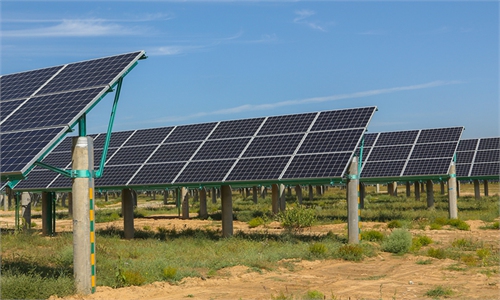SOURCE / INDUSTRIES
No region is immune to health hazards of climate change: report

Photo: Xinhua
Climate conditions which breed Dengue Fever have risen by 37 percent over the last half-century; 0.5 percent of potential work hours lost to rising heat; while harmful particulate matter 2.5 (PM2.5) fell by nearly 28 percent, resulting in 90,000 fewer deaths annually.
The three sets of data come from a report in the health and climate change sectors by the New Lancet Countdown Asia centre, which is released on Thursday.
The report noted a hotter world poses a greater risk to the health and wellbeing of people across the globe.
For China, by aligning pandemic recovery and climate plans with the country's pledge to achieve carbon neutrality by 2060, the nation can protect public health and promote economic sustainability, contributing to preserve the planet.
Driven in part by rising global temperatures, more frequent and extreme wildfires and cyclones, the spread of Dengue Fever will also have profound health impacts if left unchecked, said the report.
Annual exposure to wildfires has increased in 24 of 34 Chinese provincial-level regions since the early 2000s, while there has been a significant increase in severe typhoons over the last two decades.
Meanwhile, climate suitability for mosquito-carried Dengue Fever has risen by up to 37 percent over the last half-century, the report said.
Extreme heat affects the ability to work outdoors, and China with its large agricultural workforce has seen potential work hours fall by 0.5 percent, costing China's one percent of GDP, said the report.
Unless China and the rest of the world takes urgent action to tackle climate change, the report warns that that an ever-hotter world will likely produce shocks which threaten global health and overwhelm healthcare systems.
"As the planet's largest carbon emitter and home to one fifth of its population, the way China responds to the climate crisis is critical in both national and international terms," said Dr. Cai Wenjia, co-director of the Lancet Countdown's newly launched regional centre for Asia.
But effective policies can promote cleaner air, and improve health, the economy and the environment. For example, a reduction in coal's share in total primary energy supply amid surging investment in renewable energy, has helped China to reduce PM2.5 by 28 percent, the report said. This has resulted in 90,000 fewer related deaths annually.
While there are a number of positive policy developments in China, without a dramatic scaling up of climate action the country could risk a public health catastrophe, Cai said.
"With China investing hundreds of billions of US dollars in COVID-19 recovery efforts and being expected to produce a new set of climate plans next year, the policies made over the coming months and years will determine the course of climate change policy for decades," Cai said.
Experts suggest individuals should also proactively take the responsibility of improving the environment in the world, by choosing green transport, conserving energy consumption, and sticking to a healthy diet.

